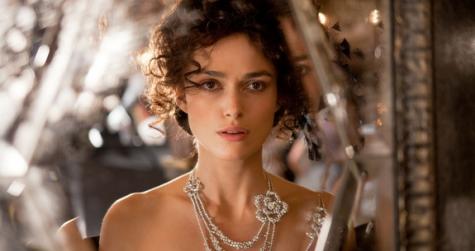The new Anna Karenina is as regal, romantic and tragic as ever.
The Tolstoy tale of a bored wife and doting mother martyred by her scandalous love for a rakish cavalry officer in imperial Russia is a perfect period vehicle for the chest-heaving Keira Knightley.
But her reunion with her Pride & Prejudice director Joe Wright has been stage-managed by the great playwright and screenwriter Tom Stoppard. And he's given Tolstoy something no earlier screen version could claim - playfulness.
Stoppard - who wrote the great play set on the back stage of Hamlet, Rosencrantz & Guildenstern are Dead - and Wright imagine the whole of Tolstoy's rich canvas of 1870s Russia as a stage - the many melodramatic characters in his upper-crust soap opera mere players, actors stepping into the spotlight, leaning over the footlights, or ducking backstage where the ugly "real" world of just-freed peasants and poverty live among the catwalks and ropes used to raise and lower scenery.
A stellar cast waltzes through stunning sets, mixed with painted backdrops and model locomotives, some covered with snow from the pre-Soviet winters. It's an obvious artifice that renders the over-the-top emotions and overly baroque decadence of Russia's ruling classes, "polite society," just a tad risible. And it's a welcome touch.
Anna Karenina (Knightley) is lost the moment she locks eyes with the preening pretty boy Count Vronsky (played by Aaron Taylor-Johnson, exchanging his Kick-Ass costume for fancy military dress).
"Give me back my peace," she pants as he curls his moustache and simmers over her.
"There can be no peace between us."
It's wrong. It's sinful. And as Anna's statesman-husband (Jude Law) lectures, "Sin has a price. You may be sure of that."
Anna has a sort of Emma Bovary boredom about her knuckle-cracking spouse, from his imperious ways of ordering her to bed to the fancy silver case he keeps his condoms in.
Vronsky forgets he is supposed to be smitten by Kitty - Princess Ekaterina (Alicia Vikander), younger sister to Anna's sister-in-law. As reckless as he is rakish, he is catnip to Anna. Countess Lydia (Emily Watson) may lecture her that her husband is a "saint" and that "We must cherish him, for Russia's sake," but Anna's not buying it.
And even though Anna just talked her sister-in-law (Kelly Macdonald, earthy and distraught) into forgiving and taking back Anna's wayward brother (the hilarious Matthew Macfadyen, Knightley's Pride & Prejudice co-star), she tumbles into an affair that will be her ruin. Will she herself be forgiven, taken back and "saved?"
Every Karenina is a product of its times, and Wright and Stoppard take pains to "see" the people the nobility do not - the rail worker killed in an early scene, assorted peasant fieldworkers, servants and the like. In trimming the bulky book, Stoppard makes sure to include the alcoholic pre-Revolution revolutionary (David Wilmot), brother to the sensitive landowner Konstantin Levin (Domhnall Gleeson), who is the noble suitor Kitty rejects for Vronsky.
Knightley and Taylor-Johnson, dolled up so that he looks like a younger Jonathan Rhys-Myers here, have a certain chemistry. But the icy parameters of a stale marriage were never more vividly captured than in the Law's scenes with Knightley. Count Karenin has a sort of compassionate severity that Law, who would have made quite the Vronsky himself, ably translates.
It's an over-familiar story, thanks to the many big- and small-screen versions of it over the years.
There are too many characters to juggle, not enough scenes suggesting Anna's obsessive devotion to her young son. But this Karenina, from its dancers-frozen-in-place waltzes to the public whispers that play like shouted indiscretions, reminds us that all the great period romances weren't written by Ms Austen, or even written in English.
* Anna Karenina is released in Australia cinemas on 14th February - Valentine's Day.

















__small.png)










